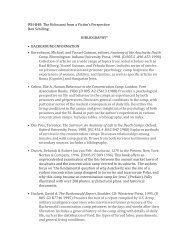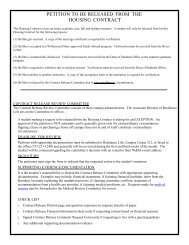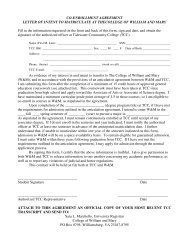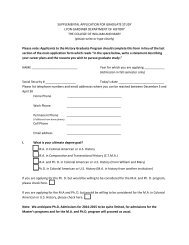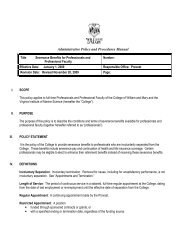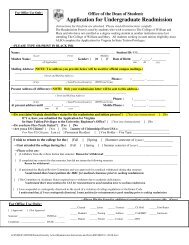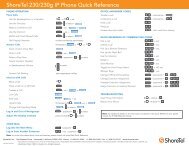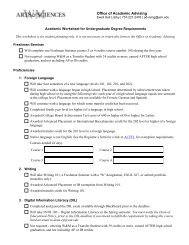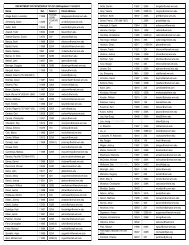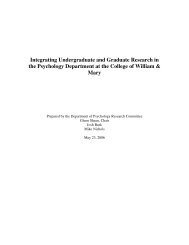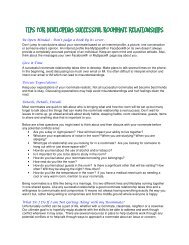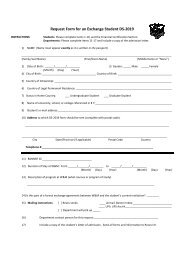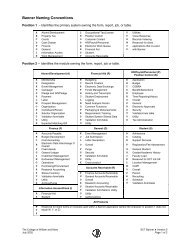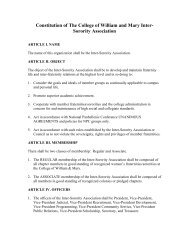Course Selection Guidebook [pdf] - College of William and Mary
Course Selection Guidebook [pdf] - College of William and Mary
Course Selection Guidebook [pdf] - College of William and Mary
You also want an ePaper? Increase the reach of your titles
YUMPU automatically turns print PDFs into web optimized ePapers that Google loves.
<strong>Course</strong> <strong>Selection</strong> <strong>Guidebook</strong> – Fall 2011division science courses in addition to the st<strong>and</strong>ard premedical prerequisite courses. In addition,students must take the MCAT <strong>and</strong> score at least a 26, with every MCAT subscore being 7 orbetter. They must complete at least 120 hours <strong>of</strong> medically related activities in the junior year <strong>and</strong>at least 60 hours <strong>of</strong> medically related activities in the senior year. The student must graduate fromthe <strong>College</strong> before matriculating at VCU.Features <strong>of</strong> the program include: Accepted students can apply elsewhere: acceptance is binding onVCU, not on the accepted student. For accepted students, VCU reserves a place in the enteringclass that matriculates in the late summer at the end <strong>of</strong> the accepted applicant’s fourth year at the<strong>College</strong>; thus, if the student chooses to graduate a year early, s/he must wait a year to start medicalschool at VCU.For more information, please contact the <strong>College</strong>’s premedical advisor, Dr. Beverly Sher, atbtsher@wm.edu .The Sharpe Community Scholars ProgramEach year the <strong>College</strong> recognizes 75 entering students with the designation <strong>of</strong> Sharpe CommunityScholar. Sharpe Scholars are highly motivated first-year students who want to connect theiracademic studies to community engagement.Embedding service into the academic curriculum, the Sharpe program stresses an integratedapproach: students live together for one year, enroll in one <strong>of</strong> several specially designated coursesduring their first semester, <strong>and</strong> simultaneously work in teams <strong>of</strong> three or four on projects designedto assist local not-for-pr<strong>of</strong>it organizations <strong>and</strong> government agencies. These projects give studentsan opportunity to apply academic concepts <strong>and</strong> theories to real world situations. Sharpe teamscontinue to develop their projects through second semester. They receive mentoring frompr<strong>of</strong>essors, agency directors, <strong>and</strong> local community leaders <strong>and</strong> are encouraged to explore variousforms <strong>of</strong> civic work. The summer after their freshman year, Sharpe Scholars may apply for grants<strong>of</strong> up to $2,000 to conduct community-based research projects in the U.S. or abroad; or they mayapply their seminar credits toward course requirements for the Community Studies Minor.Information about current Sharpe <strong>Course</strong>s may be found athttp://www.wm.edu/as/charlescenter/scholars/sharpe/index.php.For both fall <strong>and</strong> spring term, students must also enroll in a 1-credit short course CMST 100: The<strong>College</strong> & Community.For more information, please contact Monica D. Griffin at (757) 221-2495.Study AbroadStudy abroad can be included in any major with a little advance planning, so start thinking about itearly!How to plan. If you think you want to go abroad, you should discuss this with your AcademicAdvisor during your freshman year. You <strong>and</strong> your advisor should identify your academic goals,possible major/minor requirements, <strong>and</strong> GER requirements. With those in mind, you should thencome to the Global Education Office (GEO) in the Reves Center to begin looking for a program88


![Course Selection Guidebook [pdf] - College of William and Mary](https://img.yumpu.com/46952524/88/500x640/course-selection-guidebook-pdf-college-of-william-and-mary.jpg)
